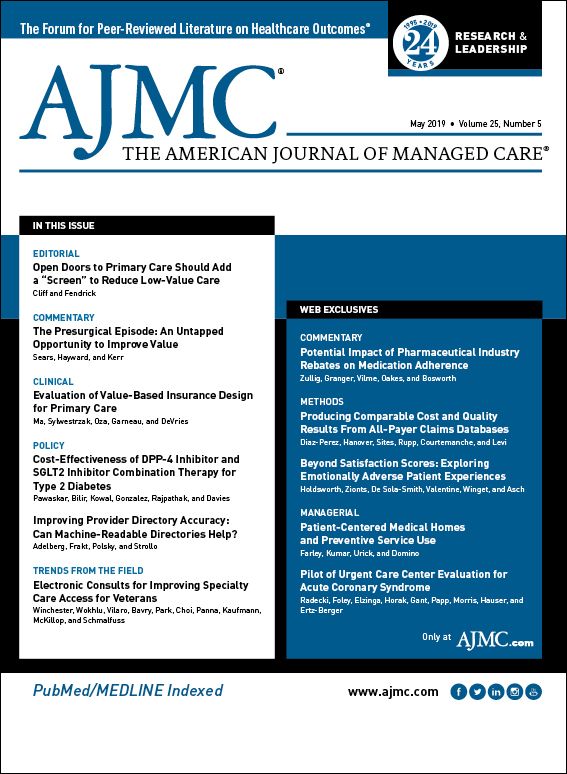- Center on Health Equity & Access
- Clinical
- Health Care Cost
- Health Care Delivery
- Insurance
- Policy
- Technology
- Value-Based Care
Clarification of References to Medication Adherence Scale
Correction to the Trends From the Field article, “Health Literacy, Preventive Health Screening, and Medication Adherence Behaviors of Older African Americans at a PCMH,” published in the September 2018 issue of The American Journal of Managed Care®.
Am J Manag Care. 2019;25(5):256The authors of the Trends From the Field article, “Health Literacy, Preventive Health Screening, and Medication Adherence Behaviors of Older African Americans at a PCMH,” published in the September 2018 issue of The American Journal of Managed Care®, have issued this statement to clarify and correct any misunderstanding caused by the abbreviations used for describing the medication adherence scale mentioned across various segments (Abstract, Methods, Results, Discussion, and Table 2) of the article.1
The medication adherence scale used in the study for the authors’ article was the Self-reported Medication-taking Scale published in 1986 by Morisky et al.2 The authors inadvertently referred to the scale as the Morisky Medication Adherence Scale and abbreviated it as MMAS. Any confusion from the inadvertent reference to the Morisky Medication Adherence Scale, as well as the use of the acronym MMAS to refer to the Self-reported Medication-taking Scale, was unintentional.
REFERENCES
1. Aranha ANF, Patel PJ. Health literacy, preventive health screening, and medication adherence behaviors of older African Americans at a PCMH. Am J Manag Care. 2018;24(9):428-432.
2. Morisky DE, Green LW, Levine DM. Concurrent and predictive validity of a self-reported measure of medication adherence. Med Care. 1986;24(1):67-74.

Empowering Children and Parents Through Technology: Opportunities, Challenges, and Future Directions
January 15th 2026Digital health platforms improve pediatric care by offering customized, interactive tools for children and parents. They enhance education, support, and engagement while tackling challenges related to access, usability, and privacy.
Read More
Insights Into Patient Portal Engagement Leveraging Observational Electronic Health Data
January 12th 2026This analysis of more than 250,000 adults at least 50 years old with chronic conditions showed lower portal use among older, non–English-speaking, and Black patients, underscoring digital health equity gaps.
Read More
Subjective and Objective Impacts of Ambulatory AI Scribes
January 8th 2026Although the vast majority of physicians using an artificial intelligence (AI) scribe perceived a reduction in documentation time, those with the most actual time savings had higher relative baseline levels of documentation time.
Read More
Telehealth Intervention by Pharmacists Collaboratively Enhances Hypertension Management and Outcomes
January 7th 2026Patient interaction and enhanced support with clinical pharmacists significantly improved pass rates for a measure of controlling blood pressure compared with usual care.
Read More

